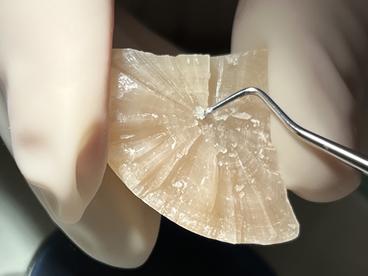Image of the month
Should you culture stones?

Stones can form because of a urinary tract infection (e.g. struvite, calcium phosphate carbonate, and ammonium urate), serve as a risk factor for urinary tract infection (UTI), and harbor bacteria that contribute to recurrent UTI. Even though these two diseases (UTI and stones) are closely related, we rarely recommend stone culture. Culturing the urine before antibiotic therapy is your best tool for assessing the patient and the disease.
Below are guidelines that may help you decide if want to culture the stone when pretreatment urine cultures were not obtained.
- If all stones were removed, there is no need to culture the stone. Even if stones were culture positive, we do not recommend treating the source when it has been eliminated. Culture urine 7 to 14 days after ending postoperative antibiotics (or sooner with persistent UTI signs) to assess the need for subsequent antibiotic prescriptions.
- If you want to prioritize dietary therapy or UTI control as your principal method to prevent struvite/calcium phosphate carbonate uroliths, culture the stone. Disease epidemiology can also help you decide. Infection-induced struvite is very common in dogs, especially females; prioritize UTI control in these cases. Sterile struvite is very common in cats, prioritize nutritional prevention in these cases. Still unsure, do both (UTI control and nutritional prevention).
- If all stones were not removed, peri- and postoperative antibiotics may change bacterial susceptibility in the patient and the stone. Culture urine 7 to 14 days after ending postoperative antibiotics (or sooner with persistent UTI signs) to assess the need for subsequent antibiotic prescriptions.
In almost all cases, culturing the urine before starting antibiotics & removing the stone is better than culturing the stone. It allows you to select effective antibiotics at the beginning of treatment.